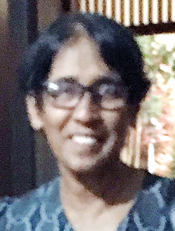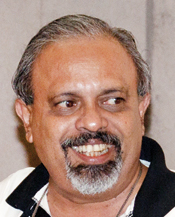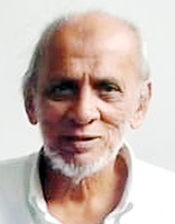APPRECIATIONS
View(s):A rare gem of a person
Manik De Alwis
 Manik De Alwis, a dear relative and friend passed away a few months ago. She was an extraordinary, rare gem of a person.
Manik De Alwis, a dear relative and friend passed away a few months ago. She was an extraordinary, rare gem of a person.
Manik was the former Dy. Chief Librarian at the Colombo Public Library where she spent a committed career spanning over four decades. After her retirement, in her early sixties, she worked at the UN International Irrigation Management Institute as a librarian. She was also organist of Christ Church Kotte for several decades on a voluntary basis, right up to the time she fell fatally ill and died of Sepsis complications of postcancer medication.
She was married to Dr. Janaka Wijetunge, Consultant Eye Specialist whom she looked after at home during his incapacitated paralytic state until his death. She is unique in having personally looked after several old and ailing people up to their demise even at the time they became bedridden and had to be attended on and tended at her home. These involved an old domestic aide, her aunt, mother, father and husband. Giving by nature, she incurred the wrath of the nursing staff for getting out of bed and attending to the wants of other patients and their needs whilst a patient herself in the National Hospital Colombo, awaiting surgery.
She led a frugal, simple life spending minimum on her own needs, but distributing a majority share of her modest income every month amongst the poor and the destitute. Financial generosity apart, her many acts of genuine kindness, involvement in helping in the lives of others, taking sick patients to hospital, being with the needy and befriending the lonely were legion.
A devout Christian, she believed that it is God who will see to her needs and had bequeathed her home and also a twin house in her premises at Gunawardene Mawatha, to the Church of Ceylon. The property and house she inherited from her husband in Wellawatte was also written by her to her husband’s relative on her demise. The bulk of her personal savings were given to her domestic aide who had served her long until her death.
It is lives like that of Manik de Alwis that inspire us, lesser mortals, to see that somewhere out there is the larger ever encompassing Great Spirit of Love and Compassion that enfolds us making us more than what we really are. “For it is in forgetting self that one finds; It is by forgiving that one is forgiven; It is by dying that one awakens to eternal life” (prayer of St. Francis of Assisi)
Sonali Wijeratne
Servatians remember their role model
Rev. Fr. Joe Rajapaksa
 Rev. Fr. Rajapaksa was born on March 13, 1907 and had his early education at St. Benedict’s College, Colombo. He graduated from the University of London with a BA Special degree in English and on his return to the country, became a Jesuit priest on August 26, 1933. He worked as the principal of St. Mary’s College, Elpitiya for few years and then took over the management of St. Servatius’ College as its first formal principal in 1947 from C. Guida. He was the heartbeat of St. Servatius’ College for 18 years.
Rev. Fr. Rajapaksa was born on March 13, 1907 and had his early education at St. Benedict’s College, Colombo. He graduated from the University of London with a BA Special degree in English and on his return to the country, became a Jesuit priest on August 26, 1933. He worked as the principal of St. Mary’s College, Elpitiya for few years and then took over the management of St. Servatius’ College as its first formal principal in 1947 from C. Guida. He was the heartbeat of St. Servatius’ College for 18 years.Father Rajapakse was a great teacher with multiple talents. He commanded respect from people of all strata of society in Matara and its suburbs due to his commitment and dedication to uplifting St. Servatius’ College in education and extracurricular activities especially cricket and football. He was an erudite teacher, efficient administrator, kind counsellor, respected sports coach, a friend in need, devoted clergyman and a rare human being.
During the early 60s, when the country went through a rapid transition, including the nationalisation of private schools and converting English medium curriculum to the Sinhala medium, Fr. Rajapakse made these transitions promptly and effectively.
During his period, the college had the most racially and religiously diverse student and teacher population compared to other schools in Matara. There were Buddhists, Christians and Muslims, and some teachers were also Tamils and Hindus (from Kerala India).
A great humanitarian, he personally helped parents and mentored students when they needed it, also providing counselling not only to needy children but their parents too.
Even though Rev. Fr. Rajapaksa did not conduct many classes, he meticulously planned educational programmes, and devoted his entire life to upgrade the level of education and discipline while promoting sports and extra curricular activities. It was during his period that the college gained the highest recognition for cricket and football producing national level cricketers and soccer players such as Thilakaantha Kasige, Karunadasa Kurukulasuriya and H. S. Ariyadasa. It was one of the golden eras of the college.
Being a keen soccer player he used to play football with students after school while coaching them in the Kotuwegoda college grounds, the present “Sanath Jayasuriya playground” .
He left the college with its acquisition by the Government in 1965.
He passed away 45 years ago on November 8. A commemoration holy mass in his memory was held on November 7 at St. Joseph’s Church Deniyaya. The Old Boys’ Association will also hold a Rev. Fr. Joseph Rajapaksa challenge trophy football tournament in appreciation of his commitment to developing football in the College.
Dr. Susantha Siriwardena
He taught us always to put humanity first
Thilina Kiringoda
 It has been two years since the passing of my father, Archt. Lalith Thilinapriya Kiringoda. He had an illustrious career in architecture and town planning for almost 40 years. He also served in the Urban Development Authority for 26 years and retired as Director (Development Planning) in 2013.
It has been two years since the passing of my father, Archt. Lalith Thilinapriya Kiringoda. He had an illustrious career in architecture and town planning for almost 40 years. He also served in the Urban Development Authority for 26 years and retired as Director (Development Planning) in 2013.Thaththa’s journey was not without its struggles. He was born to a middle-class family in Karapitiya, Galle, both parents being teachers. He lost his mother to an illness when he was studying for the G.C.E. A/L. He often told us how Seeya only wished to see him excel in academics and barred him from playing for the school cricket team. An extrovert by nature, Thaththa could not be stopped despite Seeya’s greatest efforts. He continued to take part in extra-curricular activities throughout his schooldays at Mahinda College, Galle (1961-1975).
He studied architecture at the University of Moratuwa from 1978-1982 and was a keen member of various student bodies. I never agreed with his idea of ‘fun’ during ragging and our mother always took my side during this debate. Later, when I joined the University of Colombo, he would advise me to never loiter in the canteens before lecture hours in my first year. He might have realized that it is not so ‘fun’ when his own daughter was likely to get ragged.
Thaththa was extremely warm towards his friends and family. He had a strong rapport with our mother’s family as well with whom we closely associated. He would chant a ‘special incantation’ for any young child he met during such visits which he said could bring them excellence in education. Our niece fondly remembers him as manthara kiyana seeya (an enchanter)! He would also sing lullabies in his melodious voice to the little ones. He ensured that we never missed out on his hometown and was eager to visit Galle multiple times a year, with us. He gave us two maps of Sri Lanka and we were expected to keep track of each town we passed on the Galle Road.
He was an avid reader which he passed on to my brother and me. When we were toddlers, he used to narrate stories and read to us. I remember his theatrical expressions when he explained how Dutch students ate his spicy chicken curry during his MSc days in the Netherlands, with tears streaming down their cheeks. We quickly picked up on reading and read almost everything that we could get our hands on. He used to bring us science fiction, novels, books based on subjects such as politics, architecture, etc.
At home, Thaththa would start conversations at the dinner table. He and I had many disagreements over economics, culture and politics but he always encouraged me to express my views. He was never afraid to express his opinions (sometimes to his detriment!) and confidently articulated his thoughts.
Thaththa was an active volunteer in many professional associations. He was President of the Organisation of Professional Associations (OPA) (2011-2012) among other roles and carried out his duties diligently. During his voluntary work, he was driven by the desire to serve a larger community in every way he could. Thaththa made numerous friends (and foes!), but I knew he was respected by his colleagues for standing up for his beliefs.
Irrespective of his many professional and academic accreditations, he was never one to hoard wealth. He was rather too generous with his time and money spent on others. He used to say that he was aptly named Thilinapriya (the one who desires to give gifts) by his parents! He always had a smile on his face and a kind word for those he met. Thaththa had a great sense of humour and was quick to make friends.
A life of merely 65 years was too short for a human being of such depth. He had more to offer for future generations and his sudden passing was a great loss. But his rather short life was dedicated to purposes larger than achieving individual goals. He served many years in the public sector with honour and integrity. I am thankful for all the wisdom he shared and teaching us to always put humanity first. The greatest wealth that Thaththa left us was his good name that is proudly attached to ours.
Nibbana seems far for all of us, but my sincere wish is for him to reach there soon.
Kimuthu Kiringoda (Daughter)
Memories of a kind hearted man
Siddiq Ghouse
 Mohamed Mohideen Siddiq Ghouse, known to his immediate cousins as “Sid,” passed away in Toronto, Canada, on October 10, 2022, while on a visit to be with his son and grandchildren.
Mohamed Mohideen Siddiq Ghouse, known to his immediate cousins as “Sid,” passed away in Toronto, Canada, on October 10, 2022, while on a visit to be with his son and grandchildren.
Siddiq was born on April 7, 1945, and began his education at Ms Poulier’s Nursery School, down Lily Avenue, Wellawatte, Colombo, which school abutted his home. Thereafter, in 1950, he moved to Royal Primary School, Colombo, wherein he was a very active student who excelled in his studies, a prefect, and completed his primary education.
Moving on to Royal College, Colombo in 1956, his classmates always saw him as a very humble, caring, friendly person with a great sense of humour. He held the post of treasurer of the Islamic Society at College in the mid-sixties.
Siddiq started his working career at Chartered Bank in Colombo Fort, and thereafter joined the BCCI. He then moved to the travel industry in which he spent many years in the trade. His prowess and skill in the English language took him into journalism, publishing some splendid pieces in many local and foreign newspapers and journals, the collection of which he had planned to publish as a book via Amazon/KDP.
A regular member of the Wellawatte Mosque congregation, he was always seen in the front row of the worshippers at prayer every day. His active involvement with Merci Lanka in constructing tube wells for several poor villages suffering from drought across Sri Lanka is most commendable.
Siddiq lost his wife, Fenoza Zahir, some years ago, and he leaves behind an only son, Shiham, who is now resident with family in Toronto, Canada.
Our earnest prayer is that Siddiq will be exalted to the highest abode in Paradise for all the goodness and compassion he sowed during his sojourn on Earth.
“From Him do we come and unto Him we return.”
Fazli Sameer, Firoze Sameer & Cousins
Searching for an ideal partner? Find your soul mate on Hitad.lk, Sri Lanka's favourite marriage proposals page. With Hitad.lk matrimonial advertisements you have access to thousands of ads from potential suitors who are looking for someone just like you.


